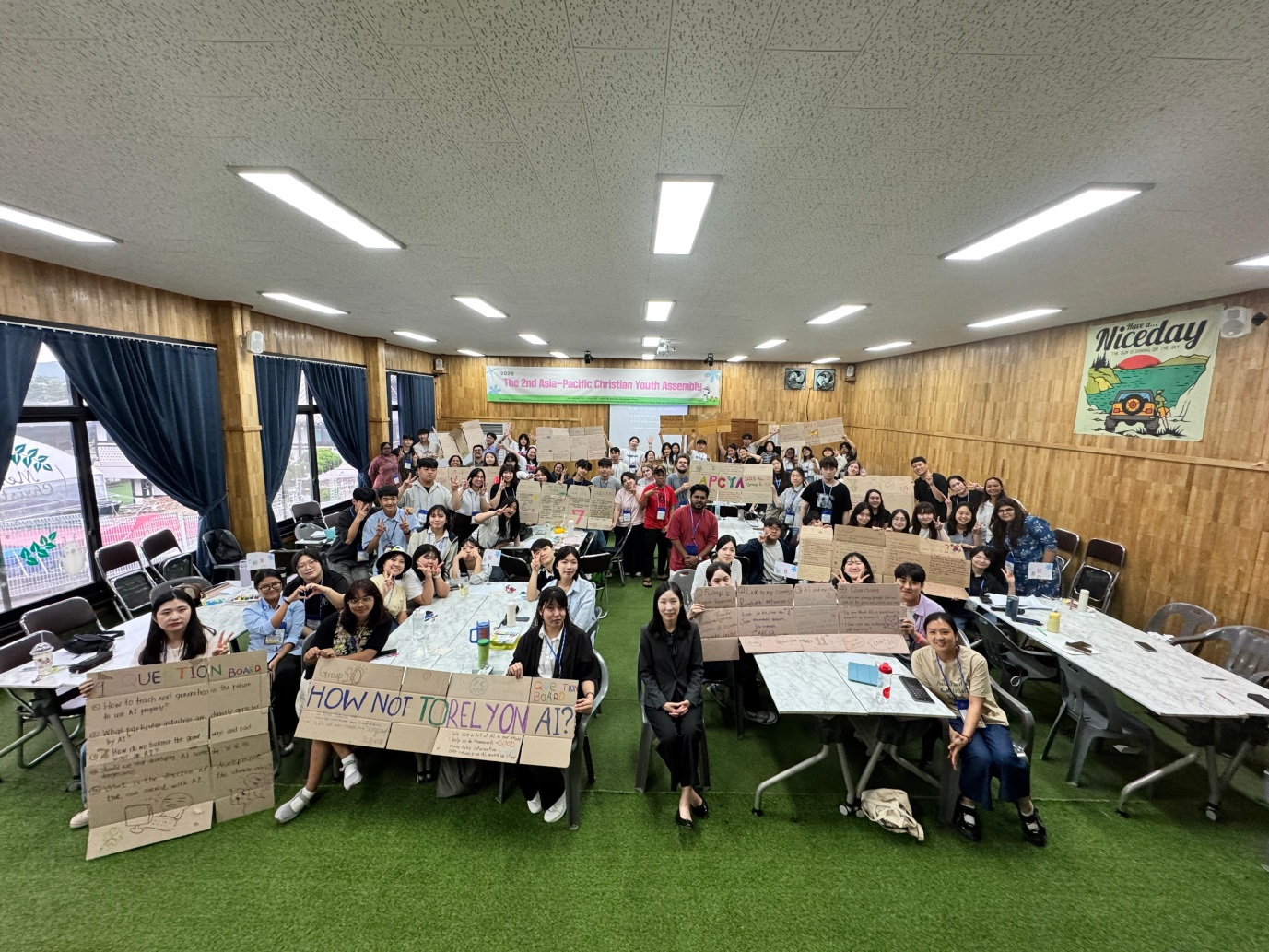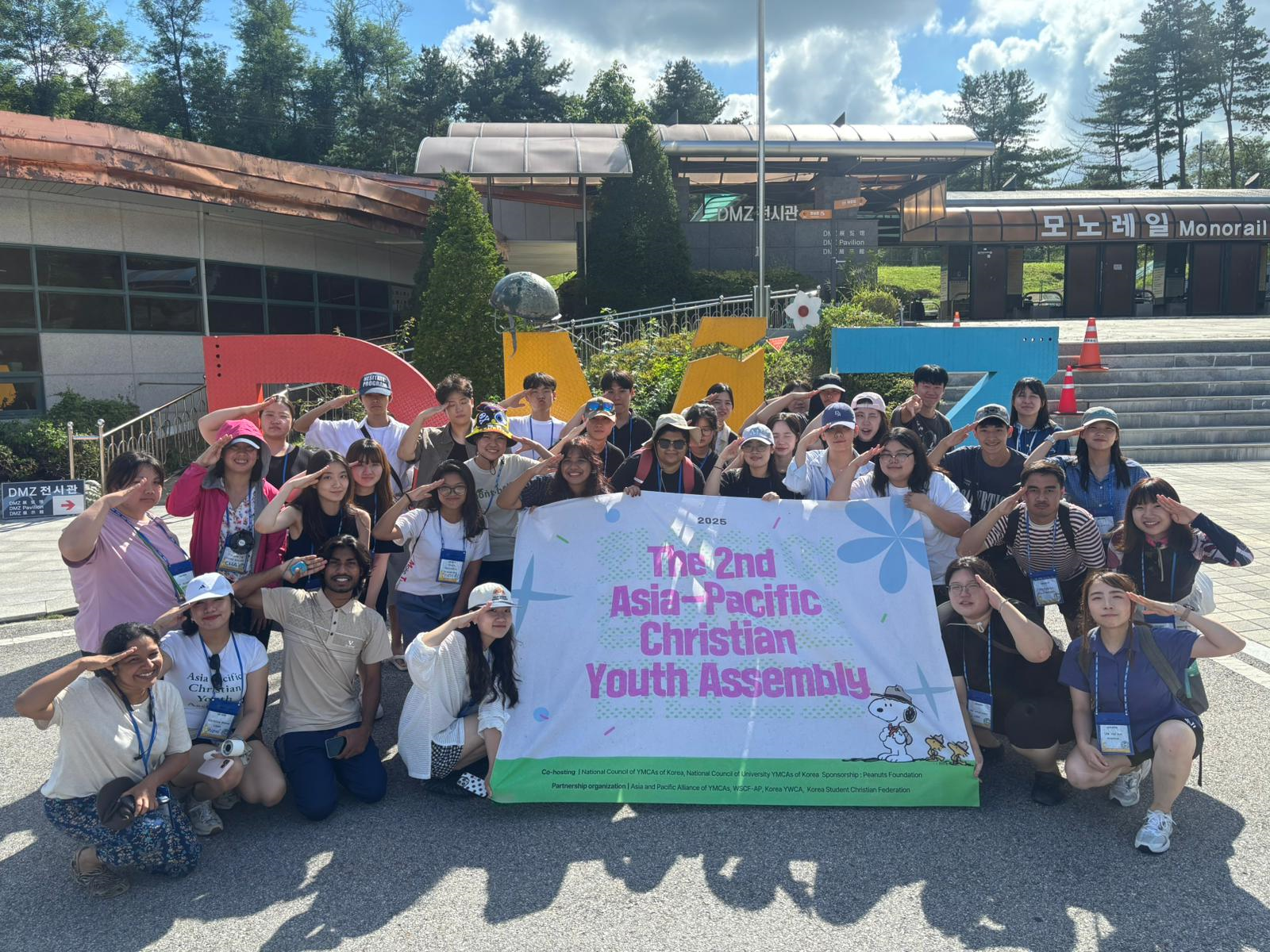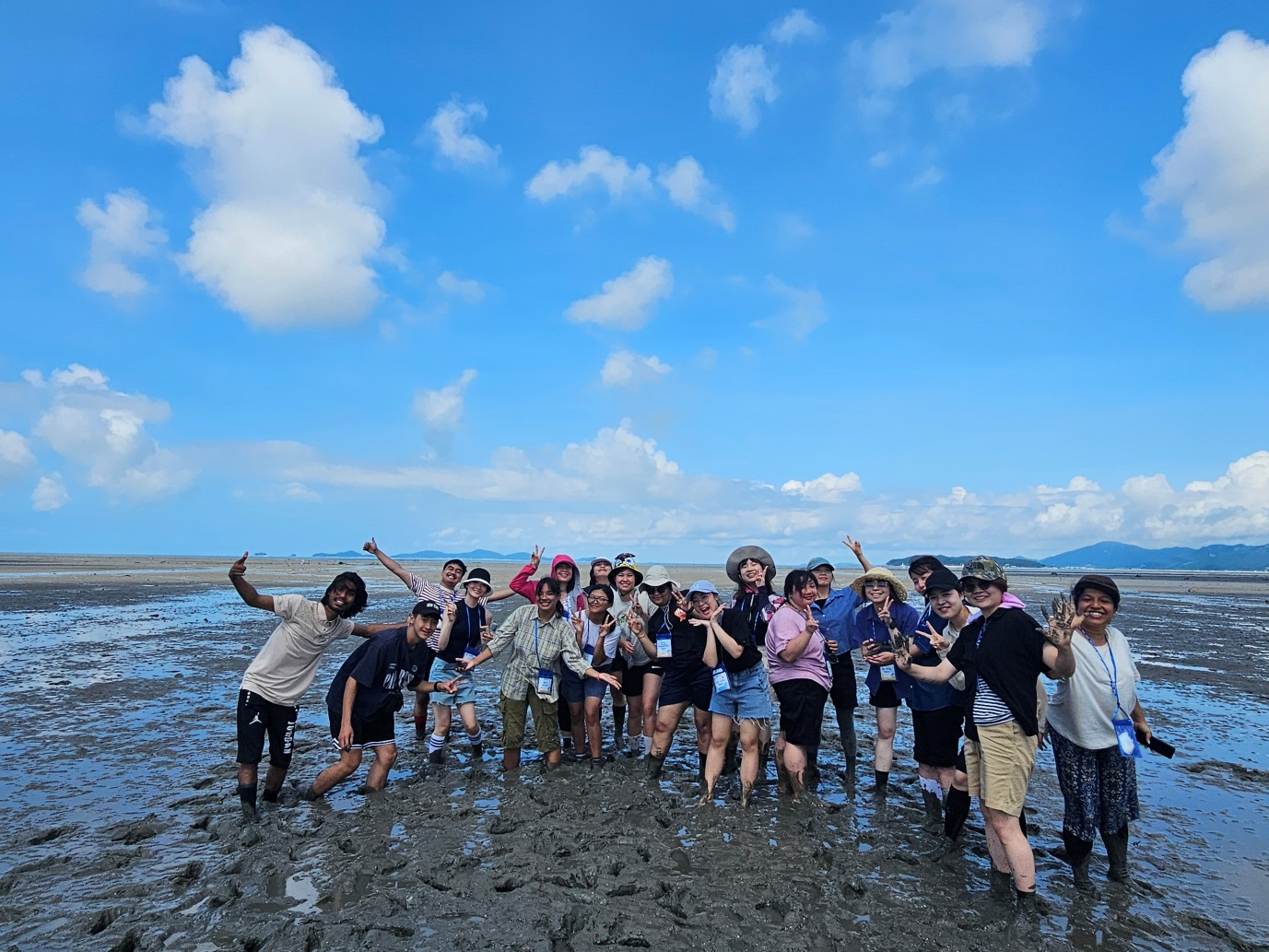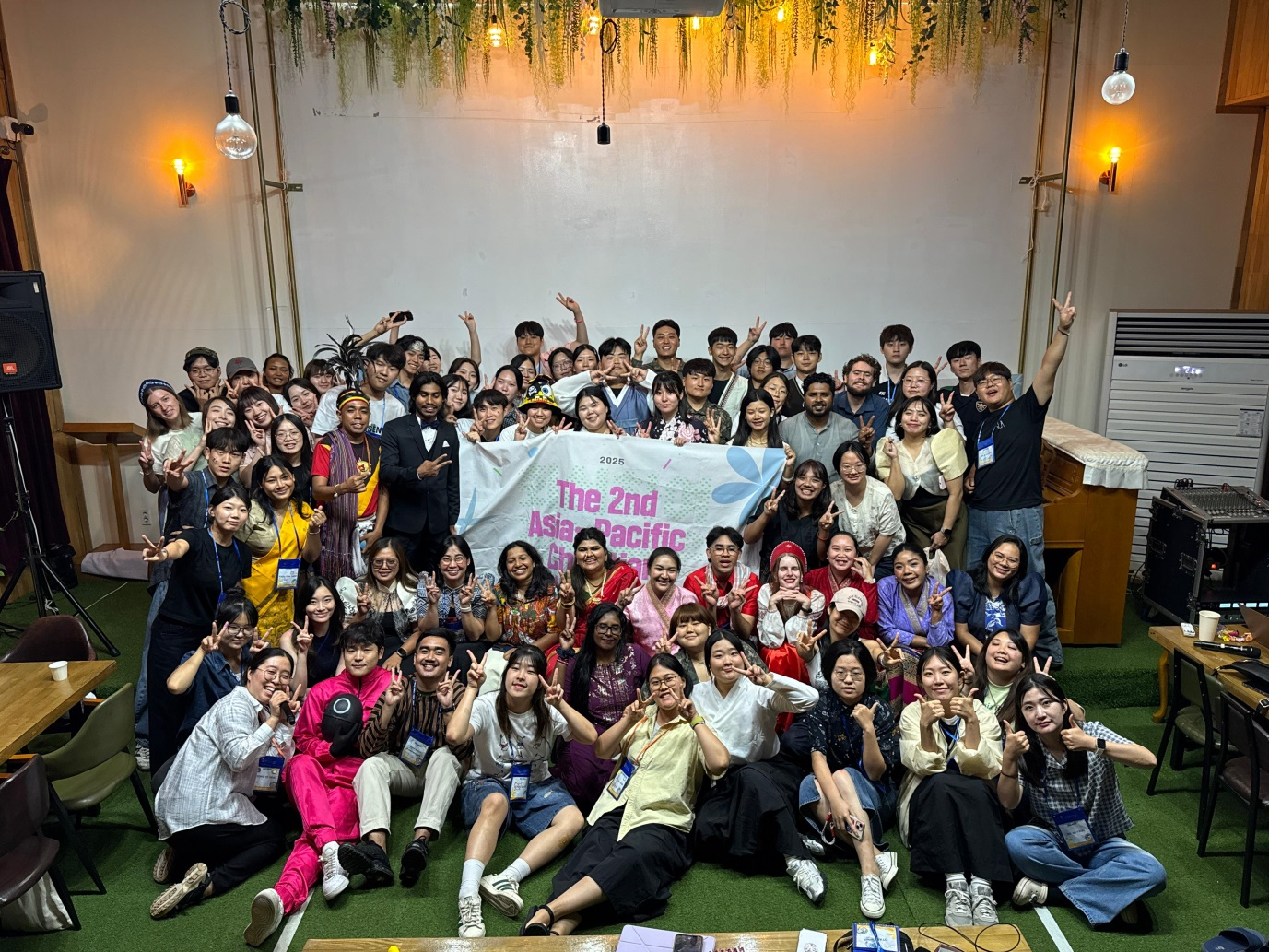The 2nd Asia-Pacific Christian Youth Assembly
Last Updated (Wednesday, 10 September 2025 12:26)
The 2nd Asia-Pacific Christian Youth Assembly
80 Christian Youth from 15 Countries Ask about the Future of Climate, Peace, and the AI Era
The 2nd Asia-Pacific Christian Youth Assembly was held in Paju, Republic of Korea, from August 19 to 23, 2025. This Assembly brought together more than 80 young people from 40 organizations across 15 countries in the Asia-Pacific region, including the World Council of Churches (WCC), the World Student Christian Federation Asia-Pacific (WSCF-AP), the Asia and Pacific Alliance of YMCAs (APAY), the Presbyterian Church in Taiwan, the National Federation of University YMCAs Korea, and the YWCA of Korea.
The theme of the Asia-Pacific Christian Youth Assembly, “Conversion to a Just Transition!”, emphasizes not only overcoming challenges at the individual level, but also the collective conversion and transformation of life toward a just and peaceful community. Centered on this theme, the Assembly aims to (1) train young leaders on climate justice, peace, and just transition, and (2) build and strengthen networks among Christian youth organizations in the Asia-Pacific region. In particular, this year’s Assembly focused on the theme of climate and peace in the era of AI transformation.

President Kwan-Woo Shin (NCY-Korea) gives a welcome speech.
On August 20, 2025, with the Opening Worship Service, the 2nd Asia-Pacific Christian Youth Assembly officially began. The service was led by Jung-Eun Lee, President of Soonchunhyang University YMCA. The sermon was delivered by Kyung-Min Kim, Secretary General of the National Council of YMCAs of Korea, followed by greetings from Kwan-Woo Shin, President of the National Council of YMCAs of Korea, and Woo-Taek Lim, President of the National Federation of University YMCAs Korea. A congratulatory message was offered by Boo-Won Nam, General Secretary of the Asia and Pacific Alliance of YMCAs (APAY).
In his sermon, National Secretary General Kyung-Min Kim (NCY-Korea) emphasized, “The AI digital age only gains true meaning when it encounters the path of faith.” He went on to say, “In this era of climate crisis, AI civilization, and conflicts and wars, May we rise and soar like butterflies of God’s Kingdom.” President Kwan-Woo Shin (NCY-Korea) reflected, “Although we come from different countries, languages, cultures, and organizations, we stand before one common question: ‘What kind of future do we want to live together?’” He added, “Together with you, we hope to cultivate a new faith-based ‘literacy’ to live through the AI era—with deeper faith beyond technology, and deeper reflection beyond speed.” General Secretary Boo-Won Nam (APAY) emphasized that in this era of climate crisis and war, it is more important than ever to have a space where young people from the Asia-Pacific region can gather, engage in dialogue, and build solidarity. He expressed his support and encouragement for the youth who participated in this Assembly.

The participants made a board with their questions and opinion on the keynote speech.
In the keynote lecture, Prof. Yoon I-Sil of Yonsei University highlighted the ethical challenges posed by the AI transformation era and the Christian response to them. She began by explaining the three stages of Artificial Intelligence (AI)—Narrow AI, General AI, and Superintelligence—pointing out that AI has already moved beyond being a mere tool and is now deeply involved in society, economy, politics, and even warfare.
She warned that the military use of AI, such as autonomous weapons and drones, could lead to civilian casualties and leave a vacuum of accountability. Furthermore, she stressed that deepfakes, disinformation, and surveillance capitalism are shaking the very foundations of democracy, threatening both truth and freedom. The connection between AI and the climate crisis was also emphasized. Large-scale data centers and AI model training consume massive amounts of energy, leading to carbon emissions, while the extraction of rare minerals for technological infrastructure results in environmental destruction and worsens global inequality.
As Christian ethical alternatives, Prof. Yoon proposed the principles of stewardship, the preferential option for the poor, and the theology of kenosis (self-emptying). She underlined that technological progress must prioritize human dignity, the common good, and appropriate use within local contexts. Concluding her lecture, she posed a question to the youth: “More important than technology itself is the question: What kind of society do we want to create?”

The participants visited DMZ area.
On August 21–22, participants visited the Ganghwa mudflats, the DMZ, the columnar jointing cliffs, and the Hantangang UNESCO Global Geopark, where they directly experienced and deeply reflected on the values of ecology and peace. At the mudflats, they explored the precious significance of ecological diversity and its close connection to the climate crisis. Standing before the magnificent scenery of the columnar joints, they were reminded of the urgent importance of preserving nature. At the DMZ, they confronted the stark reality of the Korean Peninsula’s division and reflected on how this space should be approached not from the perspective of security, but from the perspective of peace, in order to prepare for the future.

The participants had a mudflat experience.
Such field experiences were not merely visits or sightseeing, but meaningful learning journeys that reaffirmed the values we must uphold and the directions for action we must take in the midst of both nature and history.
On the final day of the Assembly, the drafting of the declaration as well as the formation of the Steering Committee and the Executive Committee took place. The declaration of this Assembly was not written by a small group of authors alone, but was created by collecting the opinions and questions that participants had continuously shared through an online platform during the Assembly. These contributions were then organized and categorized using AI analysis tools. Based on the data generated by AI, the Drafting Committee prepared a declaration that reflected the collective voice of the participants. In addition, participants gathered in national groups and each country committed to one concrete action to be practiced over the coming year, which was incorporated into the final declaration.
Declaration Drafting Committee
- Benedict Joshua Sarker / Bangladesh / WSCF-AP
- Christopher James Burton Hawkins / New Zealand / WSCF-AP
- Panhalkar Nikita Bansi / India / YWCA of India
- Soo-Min Kim / Republic of Korea / President, Yeungnam University YMCA
In addition, an Organizing Committee composed of participants of the 2nd Asia-Pacific Christian Youth Assembly and an Executive Committee composed of Korean participants were newly elected. The Organizing Committee will evaluate this Assembly and jointly plan the overall direction of the 3rd Assembly, while the Executive Committee will review the feasibility of the Organizing Committee’s decisions in the Korean context and take responsibility for the actual preparation and implementation of the 3rd Assembly. Through this structure, the Assembly is designed to be shaped by the active participation and voices of its members, while also strengthening networks among organizations for the future.

Asia-Pacific Christian Youth Assembly 2025 Declaration, Paju Korea
Today as young people in the Asia-Pacific, we live in an age of overlapping crises. The climate crisis threatens our homes, food, and futures, displacing the most vulnerable. Militarization and conflict continue to steal lives, resources, and peace from our communities. In the era of digital transformation, many of us experience a deep digital divide, and artificial intelligence is misused for war, surveillance, misinformation, and exploitation, while its hidden carbon footprint worsens climate change. These challenges weigh heavily on our hearts, our families, and our societies.
We affirm our calling to be peacemakers. We believe in climate justice that protects creation and ensures that no community bears unfair burdens. In the digital age, we uphold principles of justice, transparency, responsibility, human dignity, and fairness. We seek technology that serves humanity, not harms it; that builds trust, not fear. Rooted in faith, love, and solidarity, we commit to humility and stewardship—living sustainably, acting responsibly, and choosing dialogue over division.
We, the youth of the Asia-Pacific, commit to act in unity across borders, faiths, and cultures. Inspired by our prayers for peace, our grief over suffering, and our hope for renewal, we pledge to be chain- breakers, peacemakers, caretakers of creation, and ethical leaders in the digital future. Together we will resist despair and live out hope, ensuring that future generations inherit love, faith, hope and solidarity that will allow them to live life in fullness regardless of the momentous challenges that lie before us.
Russia : We are going to do an eco-checklist for our local camps so they could be more eco-friendly, also we are going to create ecological games for our camp participants which will teach them how can they care more about the environment.
Indonesia : Taking the lead to communicate, inform, and coordinate youth organizations in Indonesia, government related institutions, and NGOs to carry out social movements that advocate and conduct scientific research on climate and justice conditions in Indonesia such as issues of forest land exploitation, tolerance, and other related challenges.
Philippines : AI literacy to implement a structured training to understand and inform the benefits of Artificial Intelligence while addressing associated risks and challenges and environmental footprints.
Japan : The YWCA and YMCA in Japan will co-host a lecture on “Environment and Peace in Japan.”
Thailand : In Thailand, we will continue to help to preserve our ecology by continuing to do and more commit to our Chiang Mai YMCA and World YMCA 2030 vision on climate change and sustainable planet. We will become green Ambassador and educate ourselves so that we can share the correct information to our friends and family, inner circle first then we can expand to others.
Hong Kong : We declare to carry out workshops on fostering a safe, ethical and informed use of AI in to all generations in Hong Kong.
India : We will launch our 'Carry your bottle, Beat the waste' campaign at various events organized by our 100 associations across the country.
Korea : Practice one new climate action each month, build habits, and separate waste properly.
Bangladesh : Be self-aware. Workshops on safe AI usage, how climate change is connected to using AI in schools , college, communities. Social awareness building
China : Training models consumes a significant amount of electricity, and I hope to find a balance between generating high-quality AI models and minimizing energy consumption. Enabling everyone to enjoy the convenience of high-quality AI in their daily lives.
Sri Lanka : I will plan for a beach clean-up workshop together with Sri Lankan SCM'ers.
Cambodia : Promote AI & Peace by organizing workshops on the positive and negative impacts of AI, creating awareness videos about AI to prevent fake news, and using AI to generate positive quotes and phrases
New Zealand : We will write to our political leaders to raise the issue of autonomous weapons.
23th August, 2025
Participants of the 2nd Asia-Pacific Christian Youth Assembly





